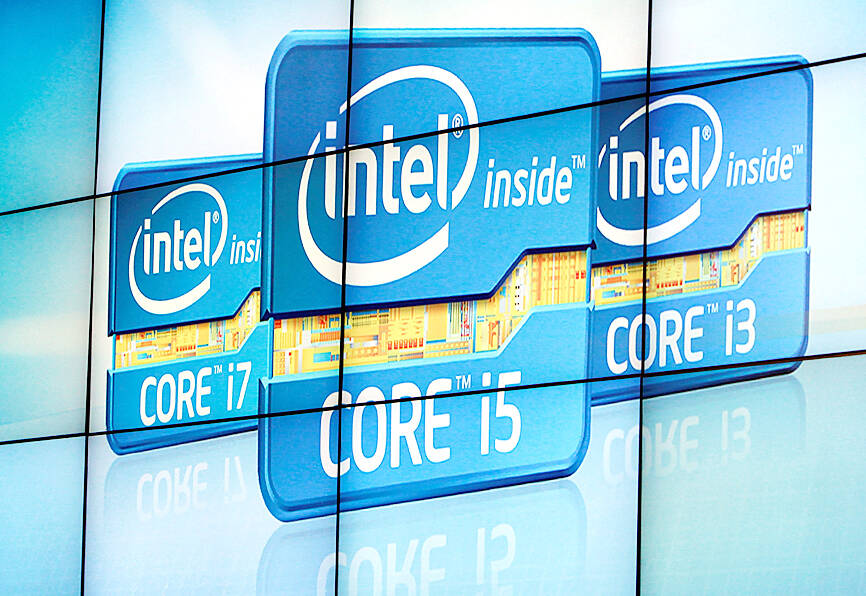Incoming Intel Corp chief executive officer Lip-Bu Tan (陳立武), who was named to the position last week, would receive compensation valued at about US$69 million if he reaches targets over the coming years.
The package includes a salary of US$1 million, plus a 200 percent performance-based bonus, the chipmaker said in a filing on Friday.
The package also includes US$66 million in long-term equity awards, stock options and new-hire incentives.

Photo: Reuters
Separately, Tan agreed to buy US$25 million in Intel shares in the first 30 days of taking the job.
“Lip-Bu’s purchase reflects his belief in Intel and commitment to creating shareholder value,” the company said in a statement.
On Wednesday last week, Intel announced Tan was filling the role left vacant when the board ousted his predecessor, Pat Gelsinger. The semiconductor industry veteran, who previously served as an Intel board member, is tasked with trying to return the company to the forefront of an industry that it dominated for decades.
Tan, 65, would assume the role tomorrow, the company said.
He would rejoin the board as well after stepping down in August last year.
Intel’s stock has rallied this year, gaining 20 percent, including a surge of 15 percent on Thursday following the announcement of Tan’s appointment.
Tan, a Malaysian-born executive, grew up in Singapore, where he attended Nanyang University and studied physics. He later went to the Massachusetts Institute of Technology, gaining a masters in nuclear engineering. He gave up his studies for a doctorate in that field and left for the University of San Francisco, where he got an MBA.
After working in venture investing, he joined the board of Cadence Design Systems Inc in 2004. He became coCEO in 2008 after incumbent Michael Fister left and then took sole possession of that role in 2009. Tan ran the company for more than a decade before moving to the position of chairman, which he occupied until 2023.
“During his time as CEO, Cadence more than doubled its revenue, expanded operating margins and delivered a stock price appreciation of more than 3,200 percent,” Intel chairman Frank Yeary said in a separate statement. “He also knows Intel well, both as a partner when he ran Cadence and having recently served on our board.”
If Tan cannot orchestrate a similar turnaround at Intel, “it was probably unfixable,” Bernstein Research senior analyst Stacy Rasgon said.

TARIFFS: The global ‘panic atmosphere remains strong,’ and foreign investors have continued to sell their holdings since the start of the year, the Ministry of Finance said The government yesterday authorized the activation of its NT$500 billion (US$15.15 billion) National Stabilization Fund (NSF) to prop up the local stock market after two days of sharp falls in reaction to US President Donald Trump’s new import tariffs. The Ministry of Finance said in a statement after the market close that the steering committee of the fund had been given the go-ahead to intervene in the market to bolster Taiwanese shares in a time of crisis. The fund has been authorized to use its assets “to carry out market stabilization tasks as appropriate to maintain the stability of Taiwan’s

STEEP DECLINE: Yesterday’s drop was the third-steepest in its history, the steepest being Monday’s drop in the wake of the tariff announcement on Wednesday last week Taiwanese stocks continued their heavy sell-off yesterday, as concerns over US tariffs and unwinding of leveraged bets weighed on the market. The benchmark TAIEX plunged 1,068.19 points, or 5.79 percent, to 17,391.76, notching the biggest drop among Asian peers as it hit a 15-month low. The decline came even after the government on late Tuesday authorized the NT$500 billion (US$15.2 billion) National Stabilization Fund (國安基金) to step in to buoy the market amid investors’ worries over tariffs imposed by US President Donald Trump. Yesterday’s decline was the third-steepest in its history, trailing only the declines of 2,065.87 points on Monday and

TARIFF CONCERNS: The chipmaker cited global uncertainty from US tariffs and a weakening economic outlook, but said its Singapore expansion remains on track Vanguard International Semiconductor Corp (世界先進), a foundry service provider specializing in producing power management and display driver chips, yesterday withdrew its full-year revenue projection of moderate growth for this year, as escalating US tariff tensions raised uncertainty and concern about a potential economic recession. The Hsinchu-based chipmaker in February said revenues this year would grow mildly from last year based on improving supply chain inventory levels and market demand. At the time, it also anticipated gradual quarter revenue growth. However, the US’ sweeping tariff policy has upended the industry’s supply chains and weakened economic prospects for the world economy, it said. “Now

An employment discrimination lawsuit against contract chipmaker Taiwan Semiconductor Manufacturing Co (TSMC, 台積電) might soon be expanded after a hearing in a federal court in San Jose, California, on Tuesday to add 15 plaintiffs to the case. According to a court document, the lawsuit, which was refiled in November last year as a form of a class action with 13 plaintiffs in California, wants to add 15 plaintiffs from Arizona, where TSMC is building up its wafer fab capacity. TSMC first committed between 2020 and last year to invest US$65 billion in three advanced wafer fabs in Arizona. It then pledged an